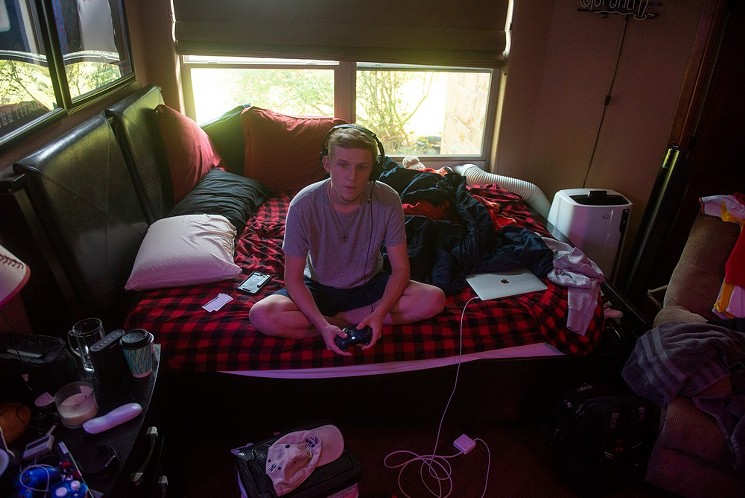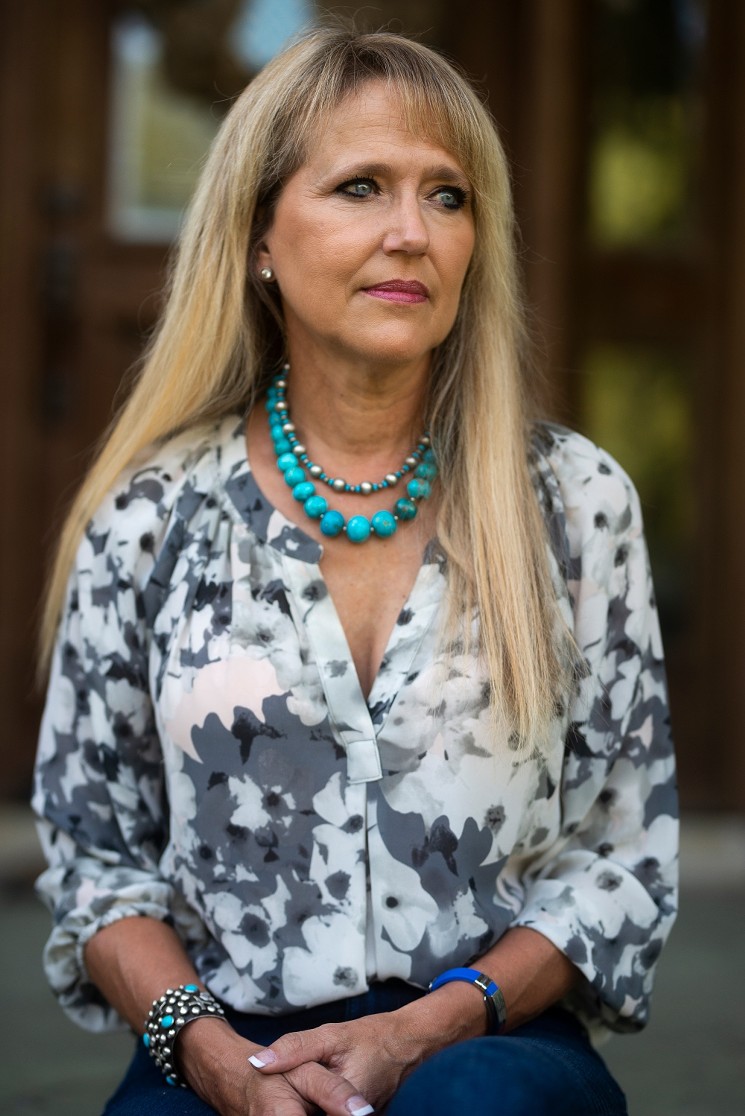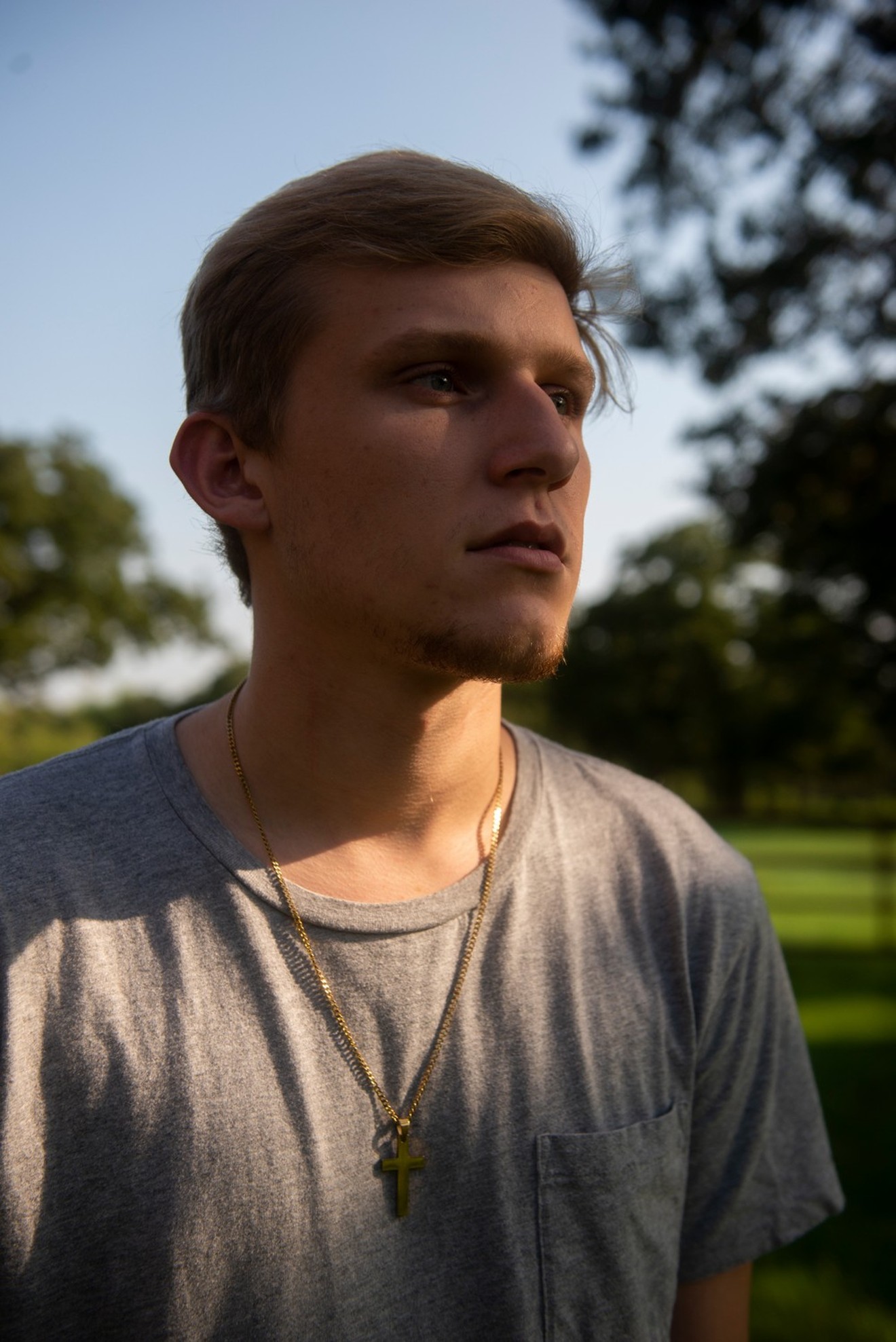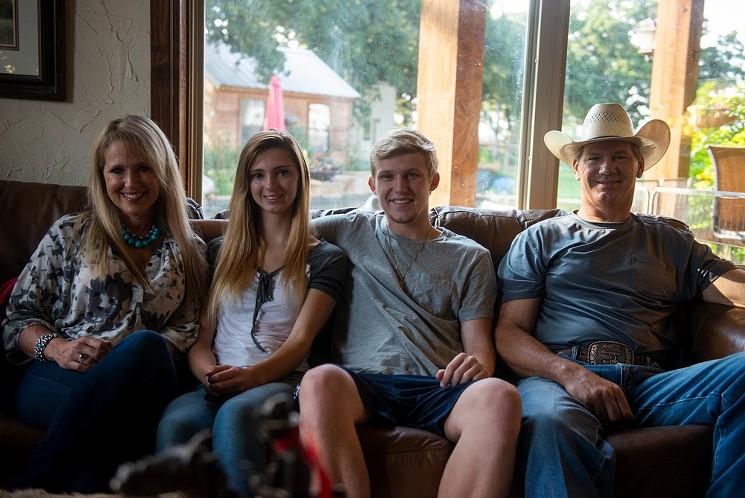In Old School, Will Ferrell’s “Frank the Tank” and his frat boys go streaking, tie cinder blocks to their penises and watch a pledge die while lube wrestling topless coeds.
If only today’s fraternities were so tame.
In the real world, 18-year-old Beta Theta Pi pledge Blake Novacek says he was blindfolded, sucker punched with a baseball bat and suffered irreparable brain damage during hazing. The incident prompted a lawsuit, and the fraternity and the members named in the suit deny all of Novacek’s claims. Novacek’s lawyer says he has evidence of a cover-up by the fraternity.
Novacek claims the hazing left him suffering depression, suicidal thoughts, two admissions into mental hospitals and physical maladies that transformed his bright broadcasting career into a diminished life.
“I keep asking my doctors and therapists the same question, ‘When will I get better?’ ’’ says Novacek, now 21. “But their answer is always the same, ‘Never.’ ’’
Says Novacek’s mother, Amy, “That fraternity … they robbed my son of his quality of life. Our new normal is completely upside-down.”
In his first interview since the events he alleges happened in 2015, Blake, son of former Dallas Cowboys star tight end Jay Novacek, speaks slowly about the bat to his stomach that led to a violent collision between his skull and a marble ledge. Sitting on a couch at the family’s ranch in Joshua, 20 miles south of Fort Worth, he details his deterioration.
His speech therapist estimates his vocabulary and quick-recall time have diminished by as much as 84 percent.
His eye doctor predicts his blurred vision is a precursor to his going blind in his left eye.
His neurologist performed a scan that revealed a traumatic brain injury and effects similar to those of an elderly patient with dementia.
He’s been diagnosed with post-traumatic stress disorder, bipolar disorder and severe anxiety disorder.
Once meticulous of the whereabouts of his keys, wallet and phone, he now misplaces them so often he’s purchased electronic tracking devices for them.
“It’s sad, because I’ve had to watch my best friend just be broken down into someone I barely know,” says Amado Martinez, who has spoken with Blake at least every other day for seven years. “He’s a shell of who he was. He’ll tell me the same exact story three times in one day without realizing it. Plus, he used to never lose stuff. Now it happens all the time.”
Once a jovial, social kid, Blake is now a recluse isolated in pain.
“Imagine having a thick rubber band real tight around your head,” he says of his incessant headache. “Now add 40 more around that one. Welcome to my world.”
He’s moody, irritable and easily distracted, to the point that he couldn’t keep jobs for more than two weeks as a website developer, sports marketer or restaurant host. He turned to medicinal marijuana to dull his migraines.
Scariest of all, Blake has twice been institutionalized, once after telling his mother about his thoughts of suicide.
“He was just going to go out on the highway and walk into oncoming traffic,” Amy says. “He’s my son, but he’s not the Blake I used to know. I can’t tell you how much that breaks my heart.”
Broadcast Bound
Jay Novacek was Jason Witten before Jason Witten. A perennial Pro Bowl tight end and Troy Aikman’s most reliable receiver, he helped the Cowboys win three Super Bowls in the 1990s.Naturally, his son was raised around football.
By age 13, Blake was reciting sports statistics, making professional connections through Jay’s introductions and falling in love with the game not on the field but behind a microphone. (In 2012 Blake worked as an intern for my radio show on 105.3 The Fan.)
“A natural sports junkie,” he says as his otherwise dull eyes suddenly sparkle. “I felt like I was destined to be a broadcaster. It’s all I ever wanted to do. All I ever envisioned.”
After his sports radio internship, he worked for an NFL website and at 16 hosted a one-hour fantasy football show on Cleburne’s ESPN Radio affiliate that earned $10,000 per month in advertising revenue. His work became so intensive that he left Joshua High School for home-schooling’s more flexible schedule. Upon graduation from Grapevine-based virtual school iUniversity Prep, he was courted by Baylor University and offered a scholarship to Oklahoma.
“Baylor told me I could be the [star] of their broadcast journalism program,” Blake says sheepishly. “But OU was an easy choice. They had two state-of-the-art studios, and by my second semester, I was promised my own radio show and a job on SoonerVision [OU’s version of the Longhorn Network].”
When Blake left Joshua for Norman in 2015, he expected to come back in four years equipped for a career as an ESPN SportsCenter anchor. Instead, he returned early with a broken brain and shattered dreams.
“Pledging was the worst decision of my life,” Blake says.
Jay Novacek was not thrilled by his son’s decision to join a fraternity, especially one of the flashiest in the country, OU’s Beta.
“I was not real high on the situation,” he says, “but I understood the appeal. He could make connections. Kids there are all over the Top 10 in their professions. I can’t tell you how many Ferraris were lined up out front. But, yeah, I knew there could be potential problems.”
During “rush,” other fraternities recruited Blake. They came to DFW, took him to Dave & Buster’s and a Texas Rangers game. Ultimately, he pledged to Beta because Amy’s father and Blake’s great uncle were Betas at Oklahoma State.The fraternity was consistently voted by students as OU’s best, although in 2014 Beta chapters on the campuses of Washington and Miami were suspended after hazing incidents. During meetings with Blake and his parents, however, numerous recruiters and spokesmen reiterated that OU’s Beta was committed to being “100 percent free” of alcohol, drugs and hazing.
“Looking back, I was so naive,” Amy says. “I fell for the sales job. We all did.”
Founded in 1839, Beta has 117 active chapters and 300,000 initiated alums. Its members include Nobel Prize winners, college presidents, Supreme Court justices and four astronauts. It boasts five core values of “intellect, responsible conduct, mutual assistance, integrity and trust.” Its mission statement: “To develop men of principle for a principled life.”
But, mostly, it boasts the house. Already exquisite in 2015, the white mansion at 800 Chautauqua Ave. has since received an $11 million renovation after the largest capital campaign in the history of U.S. fraternities. The house is 33,000 square feet across three stories. It has sleeping space for 90, dining for 120, five soundproof study rooms, a recreation room with five TVs and an outdoor basketball court.
Blake called being pursued by such a successful group “flattering.”
“We finally rationalized that it wouldn’t be a distraction for him, but would help him,” his mother says. “No alcohol. No drugs. Lots of professional relationships he could use as a stepping-stone to a career, increase his social circle with good role models. In the end, we didn’t see a downside.”
Beta Testing
On the advice of legendary Sooners football coach, former Cowboys coach and family friend Barry Switzer, Novacek moved into OU’s athletic dorm in August 2015 to be close to Beta and even closer to the players to foster his broadcasting career.He’d heard stories about frat brats: well-bred, upper-class white kids who are born on third base but act as though they’d hit a home run. They were saturated in snobbery — entitled, irresponsible and low on empathy.
“Well, yeah,” Blake says, “there was a lot of that. But I didn’t see any hint of hazing. I’d heard about it already from other fraternity pledges, so I just knew I’d made the right choice.”
Sure, the Beta active members were cocky and boisterous. They convinced themselves they invented beer pong, and their in-house vernacular made “Grab ’em by the pussy” sound G-rated. But an alum named Zach Allen, a successful, 54-year-old attorney, regularly visited the house and encouraged pledges to take alcohol/drug awareness classes.
Novacek remained convinced he needed to pledge to prove his worthiness and forge lifelong relationships with brothers who would attend his wedding, funeral and every significant event between.“I thought Beta was the clean frat, but at the parties there was everything you could imagine: alcohol, pot, cocaine, girls, whatever.” – Blake Novacek
tweet this
Then it got creepy.
Novacek was surprised to learn that, despite the “100 percent alcohol-free” recruiting pitch, Beta was on social probation for previous alcohol violations; hosted parties at two houses where alcohol and illegal drugs were available; and had an informant-based system to avoid supposedly random checks.
“I thought Beta was the clean frat,” Novacek says. “But at the parties there was everything you could imagine: alcohol, pot, cocaine, girls, whatever.”
He says Beta’s weekly calendar of events included Beer Pong Monday, Wine Bag Wednesday, an informal gathering at the Campus Corner sports bar on Thursday and parties every Friday and Saturday.
Novacek says often the alcohol and drugs were brought from a residence called the “Yellow House” just three blocks away from the frat house and owned by a Beta alum.
Beta allegedly had moles within OU’s Interfraternity Council who would tip it off to imminent alcohol checks. Since council administrators weren’t allowed to open doors to private rooms, he says before inspectors arrived, the alcohol, stored in horse troughs on wheels, was simply rolled into members’ rooms and out of sight.
In a deposition taken May 18, Beta member Shane Muselmann admitted that the frat’s parties regularly featured alcohol, drugs, girls and underage drinking by pledges. Muselmann was asked why some of Beta’s parties were held at Yellow House.
Question: Would it also be because you’re restricted from having alcohol at the fraternity house and you use Yellow House to circumvent those rules?
Answer: That could be a reason.
In late September 2015, Novacek and his 62 co-pledges were alerted by the phone app GroupMe to be on the basketball court in suits and ties. After an hour, they walked into the basement of the Beta house.
“The actives were all crammed in this room, smoking cigars and wearing purple robes,” Novacek says. “There were red light bulbs in the fixtures, making it look like we were in hell. It was the first time I was really creeped out. It just felt sketchy.”
Forced to kneel for another 45 minutes, the pledges were told, “You’re about to learn what it means to become a Beta.” They were then required to change into jeans and white T-shirts purchased at a Goodwill store and navigate musty crawlspaces into separate rooms throughout the house.
In one of them Novacek and the others were introduced to “pledge facts” — essentially the full names, hometowns and majors of every other pledge and active member. Failure to recite accurate pledge facts resulted in various punishments.
It became a random ritual.
“The first night was terrifying,” Novacek says, “but I only saw guys have to eat [tobacco] dip, do army crawls, get sprayed with a water hose and clean toilets with a toothbrush. Nothing physical or violent.”
Pledges to other fraternities shared a horror story about ice cream, in which active members would ejaculate into a bowl of soft-serve vanilla and force freshmen to eat it. Novacek once correctly recited the pledge facts of six pledges. His reward? Yep.
“No way,” he says. “I told them I was lactose intolerant.”
Boomer Sooner
Novacek, however, couldn’t talk himself out of trouble in the week after 10th-ranked OU was upset by Texas in the annual Red River Rivalry.Novacek watched the game with Beta brothers, spent the night at a hotel in downtown Dallas and attended the following day’s Cowboys-Patriots game in Arlington before driving back to campus Sunday night, Oct. 11.
After that, his memory — his life — is a blur.
“I remember the members telling us it was [the pledges’] fault that we lost to Texas,” Novacek says. “I remember most of the night I was in the room with Shane. I just can’t put things together.”
At some point the following week, Novacek says he was summoned to the Beta house via GroupMe message, but this appearance wasn’t like the others. Most, he said, occurred around 9 p.m. and this one, best he can recall, was past midnight. This time, he was blindfolded and a pillowcase was placed over his head.
Novacek says he was ushered up some stairs, then down a hallway, where he heard whimpering and screaming. Alarmed, he took off his pillowcase and peeked under his blindfold to see a pledge on the floor having a panic attack.
Usually, five or six pledges would wind up in the room of an active member. After being instructed to pull his pillowcase back on, Novacek entered a room alone with Muselmann. He says Muselmann appeared “very intoxicated.”
“I knew he had it in for me,” Novacek says, “because a couple nights before I had messed up his facts, and that really pissed him off.”
Novacek claims Muselmann took off the pillowcase and blindfold and forced him to perform a “wall sit,” positioned with his back on the wall and legs bent, only without a chair. Muselmann asked Novacek to recite his facts.
“Oh, I knew his name and everything this time,” Novacek says. “I didn’t want my ass chewed again. I knocked it out of the park.”
At that point, Novacek says he noticed a baseball bat leaning against Muselmann’s chair and a video of hogs being slaughtered playing on a computer.
Muselmann: “Do you know what this has to do with fraternity life?!”
Novacek: “I’m sorry … I don’t. I don’t know.”
“I was scared,” recalls Novacek, who, to that point, had witnessed member-pledge interactions that were disgusting, disturbing and demeaning, but never physically violent. “I mean, what the heck was that video? It had nothing to do with pledge facts, or anything we’d ever been taught.”
According to Novacek, Muselmann ordered him to put his blindfold and pillowcase back on. That’s when Muselmann swung the bat and hit Novacek in the stomach, just under his ribs. The blow caused him to first lurch backward into the wall, then lose his balance and fall. On the way down, Novacek believes the back of his head smacked into a marble window ledge. (Muselmann denies this.)
“I didn’t go unconscious at first, but I was out of it,” Novacek says. “I don’t know how long I laid there. Could’ve been one minute, 10 minutes or hours.”
He had no concept of time when he awoke on a couch in the basement. He was still wearing his Goodwill outfit, his “civilian” clothes laundered and folded next to him.
The lawsuit filed against Beta claims not only the assault, but ensuing negligence.
“Blake was carted down to the basement and put on a couch,” says attorney Chris Cooke. “He was unconscious and unattended for 10 hours, with no medical attention whatsoever.”
Hazed and dazed, Novacek only knew he had the mother of all headaches, a sore stomach and healthy dose of fear.
“I knew something happened or else I wouldn’t have slept at the house,” he says. “I was nervous. I just wanted out of there.”
As he shuffled toward the bathroom, Novacek claims he was approached by active member Gavin Martindale.
“Hey, what happened to you last night?” said Martindale, immediately providing Novacek his desired answer before the pledge could fully comprehend the question. “If you talk about any of this, we’ll have you kicked off campus. You’ll be done. We’ll ruin you and your family.”
Novacek says he arrived back at his dorm room around 10 a.m. Since he couldn’t determine what day it was, much less if he might be late for a class, he closed the curtains, got into bed and went back to sleep.
“I was trying to process it all,” he says, “but it was like a dream.”

Blake Novacek says injuries he suffered in a fraternity hazing have left him a virtual recluse. He has dreams of being a sports broadcaster.
Brian Maschino
Atypical Aftermath
When Novacek awakened in the afternoon, he and his roommate played Madden NFL on an Xbox. His decision to play a video game instead of reporting an alleged assault seems odd, but so do other aspects of the case. In extensive interviews with Blake and his family at his home, and with Cooke at his Cleburne office, the Observer asked them to explain what happened after the alleged assault.
Why didn’t Novacek seek immediate medical attention or at least document his injuries via photographs or social media?
He says there was no bump on his head from the fall. No bleeding from a wound. The impact from the bat didn’t leave a bruise.
“There was a red mark across my stomach,” he says. “But it was the headaches that bothered me. I had a concussion in 2010, and it wasn’t the end of the world. I figured it would just get better with rest and sleep.”
Explains Cooke, “Football players suffer concussions with long-term effects without as much as a drop of blood or the tiniest of bumps.”
Why didn’t Novacek immediately go to police or tell his parents?
“Simple,” Cooke says. “He feared retribution from powerful people.”
In the immediate aftermath, Blake says he told only a handful of pledge brothers about the incident. Despite his silence, he says backlash came when a truck full of Betas yelled profanities at him and his grandmother during a spring visit, and later when his car was vandalized, although he admits to having no proof the culprits were Betas.
“I knew what they were capable of,” he says. “Seemed like telling anyone would’ve been like poking the hornets’ nest.”
Even when his grades began to slip and his memory faded faster, Novacek stubbornly kept his story secret.
“I knew something was wrong,” he says. “I’d forget my backpack to class. I just totally forgot about my year-end Spanish project, things I never did before.”
Says Amy, “We were watching him let the love of his life slip right through his hands, and we had no idea why.”
Only when Barry Orr, the head of sports broadcasting at OU, pulled him aside in December did Novacek have to face that he was dealing with something out of his control.
“I was sleeping more and more and friends kept asking me what was wrong,” Novacek says. “But I didn’t think I’d changed externally until Barry told me I was there, but I wasn’t present. I was like ‘Damn, I am slipping!’ ’’
Home for the holidays after the fall semester, Novacek unraveled. Amy took him to see Dr. Greg Hoffman in Burleson for unexplained anxiety, double vision and headaches when, just after having his vitals measured, he spontaneously blurted his nightmare.
“We both broke down in tears right there,” she says. “I mean, oh my God, there’s the answer. Finally. I was scared, angry, everything.”
Why didn’t Blake immediately quit the fraternity?
“He feared retribution from powerful people.” – attorney Chris Cooke
tweet this
Novacek says initially he didn’t want to let down his family’s legacy at Beta and didn’t want to be considered a “quitter.” His plan was to lay low, get formally initiated and then go “inactive,” meaning he would be an official member of Beta without living at the house or taking part in fraternity activities.
“He was under immense peer pressure,” Cooke says. “Leaving the brotherhood is a difficult choice. It’s as though kids get under a spell.”
Novacek says he “withdrew” from most Beta activities. He believes the fact that members didn’t immediately confront him was a sign that they were aware of the hazing.
A month after the hazing, Novacek attended Beta’s annual “Barn Dance” event. He even joined in a boxing match, bloodying his nose in the process.
He also crossed paths with Muselmann.
“Oh,” Novacek says. “He was nice to me. Really nice. Like, overly nice.”
After grappling with the decision, he returned to Norman for the spring semester in January 2016 without Amy’s blessing but with Jay’s admiration.
“Training camp wasn’t a whole lot of fun,” Jay says of his time with the Cowboys. “There were days when you just really wanted to quit. But it’s the bigger goal of finishing something you started. There’s a team aspect to it. Fighting through the tough times is a rite of passage, in a way. Blake was determined that there was a great opportunity still ahead for him.”
When he returned to OU, Blake told more Beta pledges, Orr and his academic counselor Casey Partridge about the incident. With “hell week” (the final week before pledge initiation) looming, he was assured by pledge class president Lane Prado that he would still be initiated if he wanted it.
“I was so close,”Novacek says. “After all I’d been through, I wanted to make it over the finish line.”
During hell week in February, however, he was deleted from the GroupMe app alerts, and initiation came and went without an invite.
With his goal crushed and his mental health deteriorating, Novacek didn’t even attend his class finals.
“I visited him at the start of ’15 and he was so excited about his fraternity and his career and just everything,” says Martinez, a sports management major and a fraternity president at Texas A&M who had dreams of joining forces with Novacek in business after college. “I went back in the spring of ’16, and he was a different person. He didn’t care about anything. For a guy that was so focused to say things like ‘I don’t even know why I’m here anymore,’ I knew something wasn’t right. We would pass one of his fraternity brothers and he’d start twitching. He wouldn’t say a word. He was totally ashamed of the whole ordeal.”
He made stops at mental facilities but never went back to OU.
Why did Novacek wait so long to file the lawsuit?
With his future in limbo and seemingly no legal recourse for the hazing — an initial attorney declined to take his case — Novacek sought solace in the only thing that eased his pain and soothed his mood: marijuana.
“I had tried 40 different medications,” he says. “Nothing worked as well.”
Breaking the law led to him filing the lawsuit.

Amy Novacek says she hears frequently from parents of college students hurt or worse in fraternity hazings nationwide.
Brian Maschino
Enter Cooke, who upon taking the case immediately asked Novacek why he was smoking that quality and quantity of marijuana. The answer triggered the attorney, who traveled to Oklahoma the next week and set the legal wheels in motion.
“We had given up,” says Amy. “Without him getting pulled over, there’s no lawsuit against Beta.”
Hazing vs. Hoax
The lawsuit was filed on behalf of Blake Novacek in Tulsa County, Oklahoma, on Sept. 29, 2017. With depositions and subpoenas mostly fulfilled, on Sept. 20 a judge will set a trial date. The lawsuit seeks $10 million in damages from Beta, Muselmann and Martindale.“The evidence will show that Blake was indeed assaulted, suffered major injuries and that there was a cover-up by fraternity members all the way up to adult members of the foundation,” Cooke says. “We’ve got the medical evidence that bears out everything Blake claims, and we’ve got proof that despite what they want you to believe, Beta was well aware of the incident from the night it happened.”
In an emailed statement to the Observer, counsel Arthur Hoge (for Beta Theta Pi, Beta Theta Pi Corp. of Oklahoma, and the Gamma Phi Chapter of Beta Theta Pi) disputes those claims:
“We can’t comment on Blake’s motivation for filing the suit. However, based on medical records that have been produced in his litigation, Blake Novacek had two head injuries that were unrelated to any allegations against the fraternity. The plaintiff has not yet provided complete medical records. To date, no medical records of Blake Novacek seeing any health care provider in Oklahoma about a head injury, or around the time of the alleged incident, have been provided. The first mention in any medical record of any possible concussion was a Dec. 31, 2015, record of a call from Blake Novacek’s mother."We don’t believe that anything happened at Beta Theta Pi that contributed to his injuries and hope to resolve this lawsuit soon." – fraternity lawyer Arthur Hoge
tweet this
“Blake Novacek joined Beta Theta Pi at the University of Oklahoma in the fall of 2015. During rush, local alumni and volunteers met Blake and were excited to have him as part of the chapter. Unfortunately, it was not a mutual fit as evidenced by his absence from fraternity meetings and events. We don’t believe that anything happened at Beta Theta Pi that contributed to his injuries and hope to resolve this lawsuit soon. We wish him and his family the best.”
Cooke also questions OU’s administrative role in the incident, citing an internal investigation that consisted only of three handwritten notes. Mostly illegible, the notes seem to conclude that “[Beta] had heard about the incident, but had zero information … as to how it happened.”
In its October 2017 statement about the lawsuit, Beta offered a sweeping denial of the charges and a stinging indictment of Novacek’s story and character.
“We have performed an initial investigation of Blake’s allegations and have yet to uncover any evidence whatsoever which corroborates the substance of his claims,” read the statement by Allen, president of the Beta corporation of Oklahoma.
Allen also said the lawsuit was “the first any of us have heard of any of the plaintiff’s alleged grievances.” Muselmann issued a companion statement, echoing that the allegations “came as a complete surprise to me.”
Beta’s defense includes an Instagram photo of Novacek at the Oct. 11, 2015, Cowboys-Patriots game, not in Norman when the original lawsuit claims he was assaulted. Cooke shrugs off the inconsistency as a “minor clerical error” that has been amended.
“It now says ‘on or about Oct. 11,’ ” Cooke says. “Blake’s injuries are so severe he can’t recall the exact night of the assault.”
The Beta house’s security-camera footage refreshes every two weeks and wasn’t saved, and lawyers are squabbling over students’ cell phone records, so without eyewitness or other evidence to corroborate Novacek’s version of events, Cooke will depend on medical records and communications among Beta associates that he says harpoons their claims of ignorance.
In an email exchange from Feb. 14 to Feb. 24, 2016, Allen and Beta alum Dick Helton talk in detail about a “hazing incident” involving a “baseball bat” and a pledge whose father is a “known sports figure.”
Emails obtained by the Observer also allude to a phone call between the men, a mention of Switzer’s involvement as a source of the story being spread, a reference to Amy Novacek as a “Whirlybird mom” and a desire from Helton to “nip it in the bud …”
“They’re calling Blake a liar,” Cooke says. “But we’ve caught them red-handed, lying that they knew nothing about all this. His incident is just part of a pattern of cover-ups allowing Beta to get away with alcohol, drugs and crime.”
Beta responded to the exchange via its statement: “Before filing the lawsuit nearly two years after the alleged incident, based on all evidence known to us, at no time did Blake Novacek or his family or counsel ever express his assault allegations — verbally or in writing — to any other pledge or member of the fraternity, or to any alumni leadership of the fraternity. That was the point of the housing corporation’s statement shortly after the suit was filed. The text and email chain pertain to a hearsay report which Zach Allen received in January and February 2016 and which he had forgotten until it was rediscovered well after the lawsuit was filed. Mr. Allen made inquiries at the time, and the information obtained did not corroborate the report.”
The lawsuit shoves Beta even more to the center of America’s growing discomfort with fraternity hazing. In 2016, the University of Oregon’s chapter was disbanded because of hazing and, in 2017, 18 members of the Penn State chapter were arrested and charged in the wrongful death case of pledge Tim Piazza who was forced to consume 18 drinks of 80-proof vodka in 82 minutes before falling down 15 feet of stairs to his death.
“When I heard the Piazzas’ story, it broke my heart,” Amy says. “But it also gave me chills. It’s Beta, the same organization that tells everybody it’s alcohol-free. Yeah, right. They must be stopped.”
According to statistics from StopHazing.org, an 18-year-old fraternity pledge is being hazed as you read this story.
Since 2005 there have been 77 fraternity-related deaths across the country and at least one hazing fatality every year since 1970. In the last four years, there have been hazing incidents involving death or serious injury at SMU, Texas, Texas Tech and the University of Texas at Tyler.
This fall across America more than 100,000 men are pledging to college fraternities. The Piazza family last week unveiled a coalition aimed at toughening anti-hazing laws and further restricting the accessibility of alcohol at fraternities.“Beta told us there would absolutely be no hazing, and that was a flat-out lie.” – Jay Novacek
tweet this
Amy, who has been in consistent contact with the Piazzas, plans to have her family join the coalition and is pondering suggesting Blake as a potential spokesman.
“Beta told us there would absolutely be no hazing, and that was a flat-out lie,” Jay Novacek says. “This needs to be addressed, because it’s the kind of stuff that just doesn’t need to happen. In the Cowboys’ locker room we had organic bonding, but not this forced, power-hungry hazing. The stuff that made us great was that we fought on the field, but never in the locker room. It’s past time for these fraternities to learn that lesson.”
Fuzzy Future
Having already established a concussion and multiple debilitating disorders after consultations with Dr. Hoffman and Dr. Katherine Raines of Cleburne, the Novaceks’ worst fears were confirmed on April 24. A medical scan of Blake’s brain revealed significant decreased blood flow in his left temporal lobe.“They told me I had the brain of a 65-year-old,” Blake says. “Like someone with Alzheimer’s or CTE.”
He suffered two previous minor concussions in 2010, one when struck in the head by a thrown baseball and one when he fell out of a chair while horsing around with friends.
“But this massive damage to the left side of his brain,” Cooke says. “That’s not my opinion or merely the way Blake feels. It’s irrefutable, medical fact, through tests conducted by doctors.”
While he awaits the trial, Novacek spends his time taking medication, visiting specialists, exploring new treatment at places like UT Southwestern Medical Center in Dallas and hoping to salvage a career in sports media.
“I still want to be an on-air anchor,” he says. “But I admit, today I couldn’t. I’ve forgotten a lot of things, and the things I remember just don’t come to me as quickly. Being aware of that is depressing. It’s made me anti-social. I’ve got a lot to work on. But that’s still my dream. I gotta have a dream, right?”
Amy feels a nagging remorse that she didn’t act sooner by filing the lawsuit and speaking out publicly every time she reads a new hazing story. She says almost every week another family reaches out to her for advice on how to deal with a hazing tragedy.
“Each time I open a message it brings me to tears,” she says. “Because I know exactly what those poor people are experiencing. My son just wanted to learn, wanted to be around people who would enrich his life. Now he barely leaves the house, can’t remember his Social Security number and thinks about killing himself. Sad thing is there are lots of kids around the country just like him.
In Blake Novacek’s story, there is no Hollywood ending. No guarantee things will get worse before they get better, only that they will get worse.
“I want them to suffer the consequences for destroying my life,” Blake says of Beta. “People should be behind bars, and the fraternity should be kicked off campus. Then we can begin to talk about fair.”















